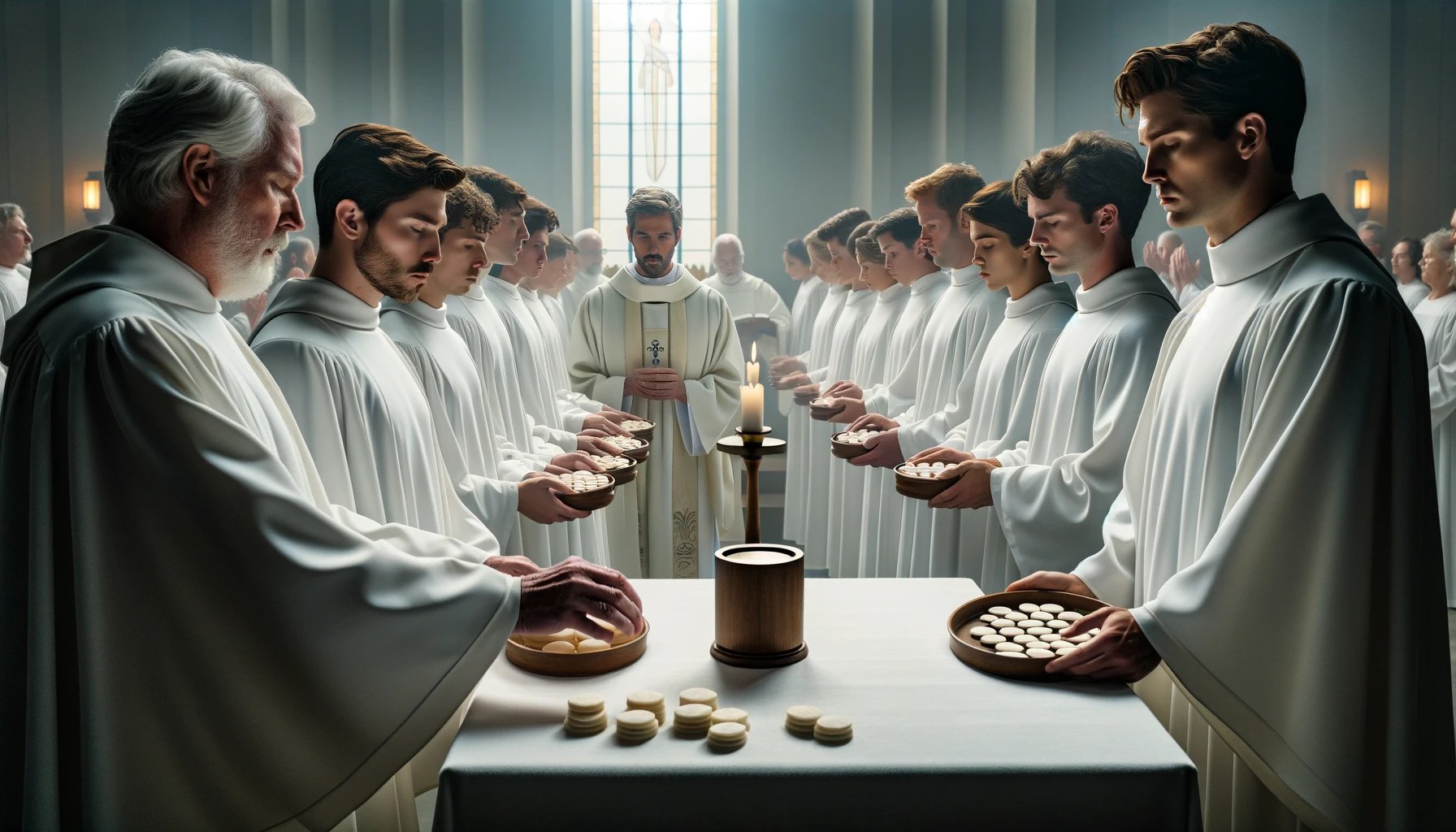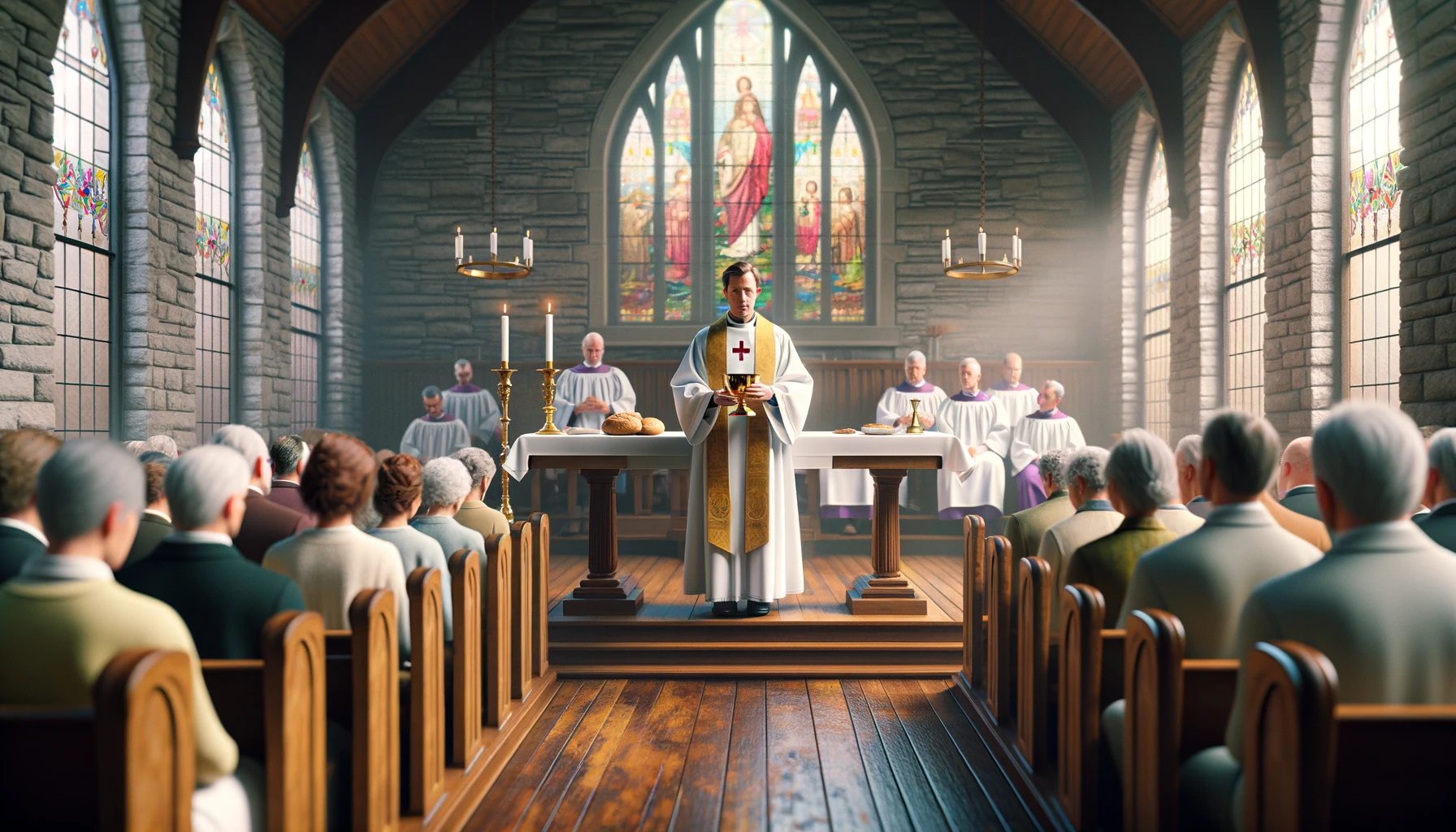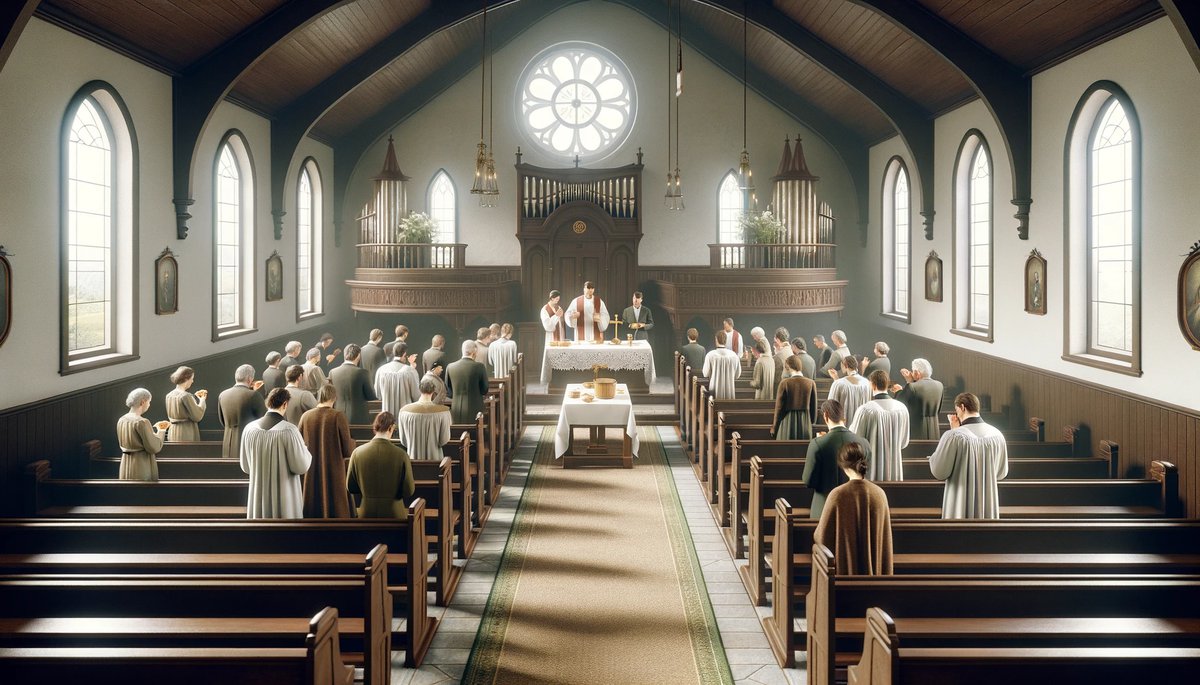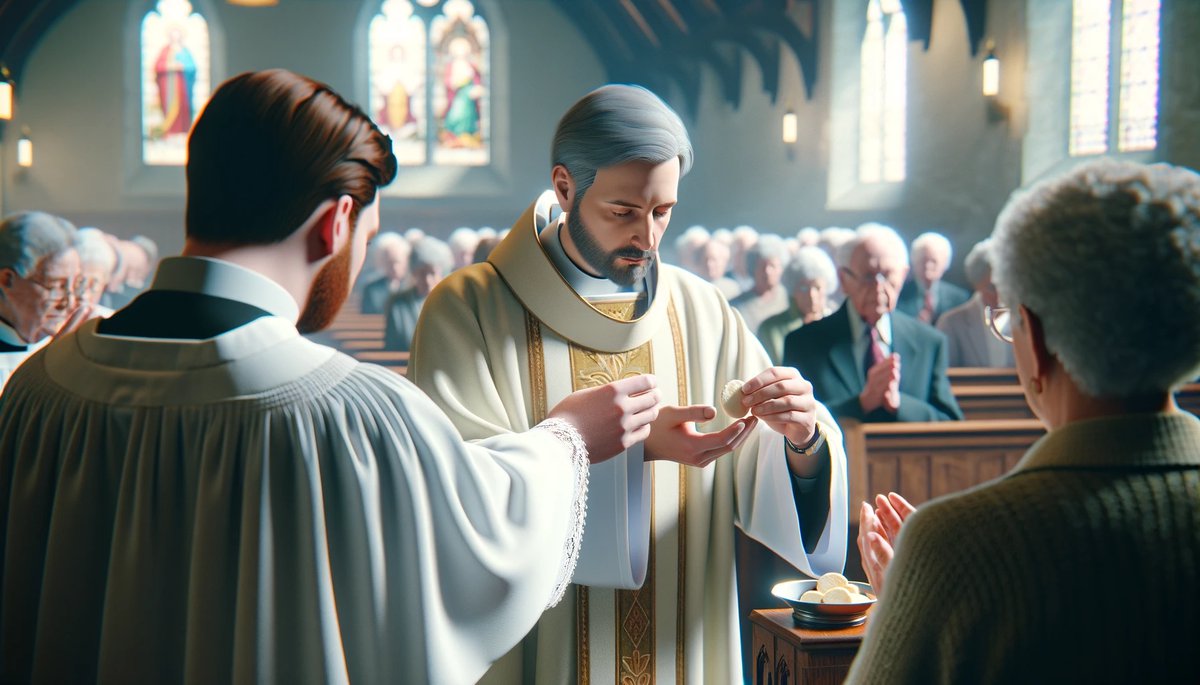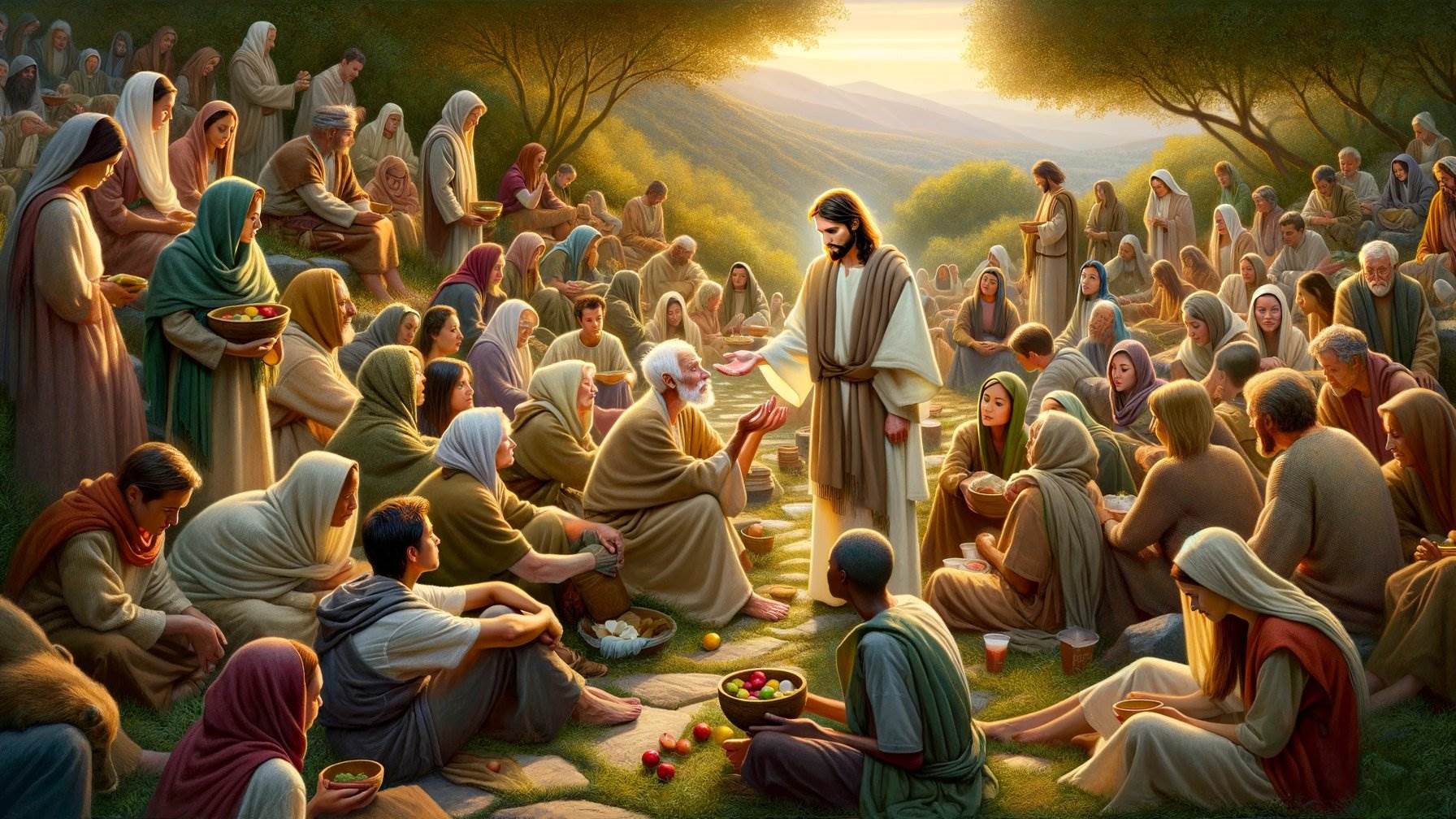Home>Theology and Spirituality>Who Can Serve Communion


Theology and Spirituality
Who Can Serve Communion
Published: February 24, 2024
Ericka Andersen, an editor at Christian.net, expertly merges digital strategy with content creation, focusing on faith and societal issues. Her communication skills enhance the platform's engaging narratives, fostering meaningful dialogue on belief's impact on society.
Learn about the theology and spirituality behind serving communion and the significance of this sacred act in Christian worship. Discover who can serve communion and the importance of this role.
(Many of the links in this article redirect to a specific reviewed product. Your purchase of these products through affiliate links helps to generate commission for Christian.net, at no extra cost. Learn more)
Table of Contents
Introduction
The act of serving communion, also known as the Eucharist or the Lord's Supper, holds profound significance in various religious traditions. It is a sacred ritual that symbolizes the spiritual nourishment and unity of believers through the sharing of bread and wine, or in some traditions, grape juice. The question of who can serve communion is a topic that sparks contemplation and discussion within religious communities, as it delves into the roles and responsibilities of clergy, lay leaders, and deacons in facilitating this sacred practice.
The significance of communion transcends denominational boundaries, as it is a central aspect of Christian worship and spirituality. The manner in which communion is administered and the individuals authorized to serve it vary across different Christian traditions, reflecting the diverse theological perspectives and ecclesiastical structures within the faith.
As we explore the question of who can serve communion, it is essential to consider the theological underpinnings and historical context that shape the practices and beliefs surrounding this sacred rite. Understanding the diverse perspectives and interpretations within Christianity regarding the administration of communion provides a comprehensive view of the roles and responsibilities of clergy, lay leaders, and deacons in facilitating this profound and sacred act of worship.
The exploration of who can serve communion invites us to delve into the rich tapestry of theological reflection, ecclesiastical authority, and the diverse expressions of faith that characterize the Christian tradition. By delving into this topic, we gain insight into the spiritual significance of communion and the various ways in which it is approached and practiced within different Christian communities.
Read more: How To Serve Communion In The Baptist Church
The Role of Clergy in Serving Communion
The role of clergy in serving communion is deeply rooted in the historical and theological foundations of the Christian faith. Across denominations, clergy members, including ordained priests, ministers, and pastors, often play a central role in the administration of communion. Their involvement in this sacred ritual is informed by theological perspectives on the priesthood, the sacramental nature of communion, and the spiritual leadership entrusted to clergy within the faith community.
In liturgical traditions such as Catholicism, Eastern Orthodoxy, and Anglicanism, the clergy, particularly ordained priests and bishops, are exclusively authorized to preside over the Eucharistic celebration. This authority is derived from the belief in apostolic succession, which emphasizes the continuity of spiritual authority passed down from the apostles to ordained clergy through the sacrament of holy orders. Within this framework, clergy are viewed as mediators between the divine and the congregation, entrusted with the sacred responsibility of consecrating the bread and wine, and administering them to the faithful during the communion service.
In Protestant traditions, the role of clergy in serving communion varies across denominations. In some churches, ordained ministers or pastors are responsible for presiding over the Lord's Supper, reflecting the emphasis on ordained leadership and the symbolic reenactment of Jesus' Last Supper with his disciples. The clergy's involvement in communion underscores their pastoral care and spiritual oversight of the congregation, as they guide and facilitate the communal experience of partaking in the body and blood of Christ.
The theological significance of the clergy's role in serving communion is underscored by their representation of Christ's presence within the faith community. Whether viewed as sacramental officiants, spiritual shepherds, or celebrants of the Eucharistic feast, clergy members embody the sacred connection between the divine and the human, guiding the faithful in the reverent observance of this central rite of Christian worship.
In essence, the role of clergy in serving communion reflects the theological convictions, historical practices, and ecclesiastical structures that shape the diverse expressions of Christian faith. Their participation in the administration of communion embodies the spiritual leadership, pastoral care, and sacramental ministry that are integral to the communal experience of partaking in the body and blood of Christ.
This section provides a glimpse into the theological and historical foundations that underpin the role of clergy in serving communion, shedding light on the diverse perspectives and practices that enrich the Christian tradition.
Lay Leaders and Communion
In many Christian traditions, the involvement of lay leaders in the administration of communion is a reflection of the priesthood of all believers and the communal nature of the Eucharistic celebration. While the role of clergy in serving communion is significant, the participation of lay leaders, including deacons and other appointed individuals, contributes to the rich tapestry of worship and spiritual leadership within the faith community.
Lay leaders, often selected and commissioned by the church leadership, play a vital role in facilitating the communion service, particularly in denominations where the priesthood of all believers is emphasized. Their involvement in serving communion underscores the communal aspect of the ritual, as it reflects the shared responsibility of believers in nurturing and sustaining the spiritual life of the faith community.
In some Protestant churches, lay leaders are authorized to assist in the distribution of the bread and wine during the communion service, working in collaboration with ordained clergy to ensure the reverent and orderly observance of this sacred rite. Their participation in the administration of communion embodies the principle of shared ministry, affirming the diverse gifts and callings within the body of believers as they collectively partake in the commemoration of Christ's sacrifice.
The involvement of lay leaders in serving communion also fosters a sense of inclusivity and shared responsibility within the faith community. It acknowledges the unique contributions of individuals who, while not ordained clergy, are called to exercise their spiritual gifts in the service of the church. This inclusive approach to communion reflects the belief that all members of the body of Christ are integral to the worship and spiritual life of the community, contributing to the vibrant expression of faith and unity within the congregation.
Furthermore, the participation of lay leaders in serving communion aligns with the biblical and theological understanding of the priesthood of all believers, emphasizing the spiritual equality and shared responsibility of the entire faith community in the worship and ministry of the church. This inclusive approach to communion underscores the diverse forms of spiritual leadership and service that enrich the communal experience of partaking in the body and blood of Christ.
In essence, the involvement of lay leaders in serving communion reflects the communal, inclusive, and participatory nature of the Eucharistic celebration, affirming the diverse expressions of spiritual leadership and ministry within the faith community. Their participation underscores the shared responsibility and spiritual equality of all believers in the reverent observance of this central rite of Christian worship.
The Involvement of Deacons in Communion
The involvement of deacons in the administration of communion holds significant theological and practical implications within various Christian traditions. Deacons, often recognized for their service-oriented ministry and pastoral care, play a distinct role in facilitating the communion service, contributing to the reverent observance of this sacred rite.
In denominations that uphold the diaconate as a distinct and ordained ministry, deacons are entrusted with various responsibilities, including the administration of communion. Their involvement in serving communion reflects the embodiment of servant leadership, as they assist clergy in preparing and distributing the elements of bread and wine to the congregation. This participation underscores the collaborative nature of ministry within the faith community, as deacons work alongside ordained clergy to ensure the orderly and respectful observance of the Eucharistic celebration.
The involvement of deacons in communion also aligns with their broader ministry of service and compassion. In many Christian traditions, deacons are called to embody the spirit of Christ's servanthood, attending to the practical and spiritual needs of the congregation. Their participation in the administration of communion symbolizes their role as humble servants, dedicated to fostering a sense of reverence, unity, and care during the sacred act of partaking in the body and blood of Christ.
Furthermore, the involvement of deacons in serving communion reflects the communal and inclusive nature of the Eucharistic celebration. Their presence and active participation contribute to the sense of spiritual unity and shared responsibility within the faith community, emphasizing the diverse forms of ministry and leadership that enrich the worship experience. This inclusive approach to communion underscores the collaborative efforts of ordained clergy, lay leaders, and deacons in nurturing the spiritual life of the congregation, fostering a sense of belonging and participation among the faithful.
In essence, the involvement of deacons in serving communion embodies the principles of servant leadership, pastoral care, and communal participation within the faith community. Their dedicated service in facilitating the communion service reflects the diverse expressions of ministry and the shared responsibility of all believers in the reverent observance of this central rite of Christian worship.
Communion in Non-Denominational Churches
Communion in non-denominational churches holds a distinctive place within the spectrum of Christian worship practices. Non-denominational churches, characterized by their autonomy and emphasis on individual and communal spirituality, approach the administration of communion with a unique blend of theological flexibility and spiritual significance.
In non-denominational settings, the observance of communion often reflects a deeply personal and communal expression of faith, transcending specific liturgical traditions or historical denominational structures. The emphasis on spiritual authenticity and the direct experience of God's presence shapes the approach to communion, fostering a sense of reverence and intimacy during the Eucharistic celebration.
The administration of communion in non-denominational churches is often marked by a spirit of inclusivity and openness, inviting all believers, regardless of denominational background, to participate in the sacred act of partaking in the body and blood of Christ. This inclusive approach reflects the non-denominational ethos of embracing diverse expressions of faith and fostering a sense of unity among believers, transcending doctrinal differences and theological distinctives.
Furthermore, the observance of communion in non-denominational churches often emphasizes the symbolic and spiritual dimensions of the Eucharistic celebration. While the specific theological interpretations may vary, the focus is on the transformative power of communion as a means of encountering the living presence of Christ and experiencing spiritual nourishment and renewal.
The flexibility and adaptability of non-denominational worship practices also extend to the manner in which communion is administered. Whether through traditional elements of bread and wine or contemporary expressions such as crackers and grape juice, non-denominational churches often seek to create a meaningful and accessible experience that resonates with the spiritual sensibilities of their congregants.
In essence, communion in non-denominational churches embodies a dynamic and spiritually rich expression of the Eucharistic celebration. It reflects the ethos of spiritual authenticity, inclusivity, and reverence, inviting believers to partake in a sacred encounter with the living Christ and fostering a sense of unity and spiritual nourishment within the faith community.
Read more: Who Are The Communion Of Saints
Conclusion
The question of who can serve communion encompasses a rich tapestry of theological reflections, historical practices, and diverse expressions of faith within the Christian tradition. From the central role of clergy in liturgical traditions to the inclusive participation of lay leaders and deacons, the administration of communion reflects the spiritual significance, communal nature, and diverse forms of ministry that enrich the Eucharistic celebration.
The role of clergy in serving communion, particularly in liturgical traditions, embodies the theological convictions surrounding the priesthood, sacramental ministry, and the representation of Christ's presence within the faith community. Their involvement underscores the sacred responsibility of consecrating and administering the elements of bread and wine, guiding the faithful in the reverent observance of this central rite of Christian worship.
In contrast, the participation of lay leaders and deacons in serving communion reflects the priesthood of all believers, the spirit of inclusivity, and the collaborative nature of ministry within the faith community. Their involvement underscores the communal aspect of the Eucharistic celebration, affirming the diverse forms of spiritual leadership and shared responsibility of all believers in nurturing the spiritual life of the congregation.
Furthermore, the observance of communion in non-denominational churches embodies a dynamic and spiritually rich expression of the Eucharistic celebration. It reflects the ethos of spiritual authenticity, inclusivity, and reverence, inviting believers to partake in a sacred encounter with the living Christ and fostering a sense of unity and spiritual nourishment within the faith community.
Ultimately, the question of who can serve communion invites us to contemplate the profound spiritual significance of this sacred ritual and the diverse ways in which it is approached and practiced within different Christian communities. It underscores the unity of believers in partaking in the body and blood of Christ, transcending denominational boundaries and theological differences to embrace the transformative power of communion as a means of encountering the living presence of Christ and experiencing spiritual nourishment and renewal.
In conclusion, the administration of communion reflects the diverse expressions of faith, the communal participation of believers, and the spiritual leadership that collectively enrich the Eucharistic celebration. It is a sacred act that unites the faithful in the shared experience of encountering the living Christ and partaking in the spiritual nourishment and unity that communion embodies within the Christian tradition.





